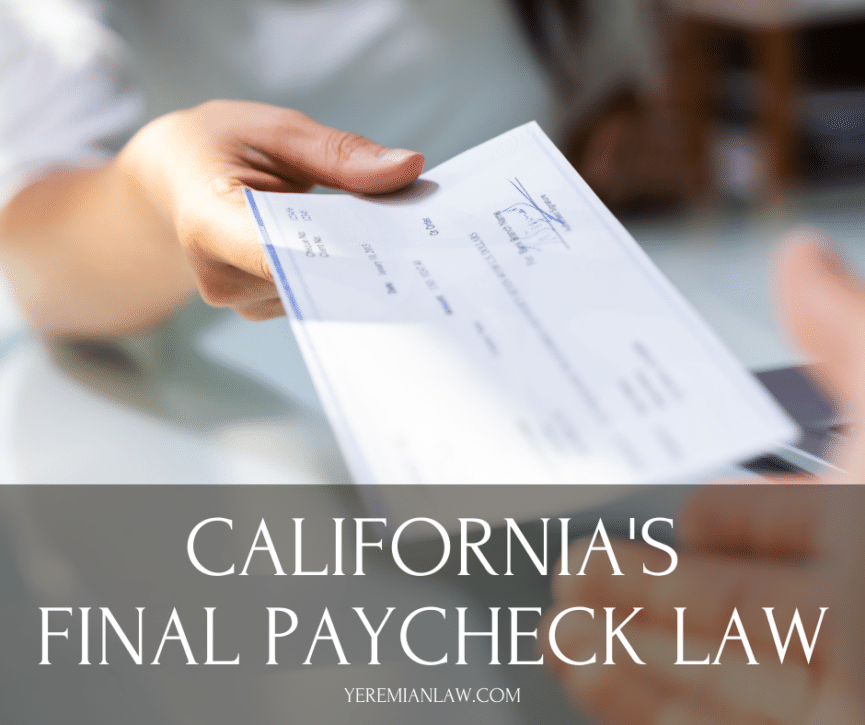California’s final paycheck law gives workers the benefit of knowing when they should receive their last paycheck from an employer, whether they quit or the employer terminates them. But what is California’s final paycheck law, what happens if an employer misses a deadline, and what recourse do you have if your employer has failed to pay you? Find out now.
California’s Final Paycheck Law
In California, the final paycheck law is very strict – and it’s enforceable when employers don’t follow it. The amount of time an employer can wait to pay you your last paycheck depends on whether you quit or the employer terminated you, but basically, this is what it looks like:
- If your employer fires you, your employer must give you your final paycheck immediately.
- If you quit without giving notice, your employer must give you your final paycheck within 72 hours.
- If you quit with at least 72 hours of notice, your employer must give you your final paycheck on your last day of work.
It’s not complicated, but some employers don’t stick to it – sometimes former employees wait weeks (or more) to receive a final paycheck. However, an employer who fails to provide that paycheck is violating the law. If you’re in a situation like this, your employer may owe you more money than just what was in your final check.
Related: FAQ on labor laws in California
Waiting Time Penalties Under California’s Final Paycheck Law
When an employer fails to give you your last paycheck, the employer can face waiting time penalties. The waiting time penalties, which the employer would ultimately have to pay to you, depend on your regular rate of pay (including your regularly worked overtime hours and commissions).
An employer might even owe you money for waiting if you receive your final paycheck on time, but it doesn’t include all the money your employer owes you.
These are the general rules that apply to waiting time penalties:
- If you work 8-hour shifts, five days a week, your waiting time penalty is eight times your hourly rate for each day the employer is late. That means if you make $20 per hour and your employer is one day late on your check, you are entitled to $160 for every day the employer is late in giving you your check.
- If you’re a regular part-time employee, the pay is based on a usual day’s work. That means if you work four hours a day, three days a week, and you earn $20 per hour, your employer will owe you $80 per late day.
- Overtime only counts if you’re regularly scheduled for it. The law doesn’t cover sporadic or infrequent overtime – so don’t bank on it if you only work overtime once in a while. However, if it’s regular, like if you work 50 hours a week every week, your employer’s penalty is the same as it would be for a standard day of work for each day your paycheck is late.
Related: Do you need an LA employment law attorney?
California’s Final Paycheck Law: Common Questions
These are some of the most common questions we get about California’s final paycheck law. If you don’t see your question answered here, please feel free to call our office at 818-230-8380 for a free consultation – we’ll be happy to give you the answers you need.
Can a final paycheck be direct deposit in California?
A final paycheck can come through direct deposit if you have previously authorized direct deposit for wages. However, if your employer regularly pays you by check and you haven’t authorized direct deposit, it can’t. Things get tricky if you quit or were fired well before payday, so even if you’re regularly paid by direct deposit, you might get a check from your employer so it can avoid waiting period penalties.
Related: Gig economy workers and California labor laws
How long does an employer have to pay you after you quit in California?
If you quit your job, your employer has to pay you your final check within 72 hours. If you quit with more than 72 hours of notice, your employer has to pay you on your last day; if you quit without notice, your employer has 72 hours to give you your money.
Can my employer pay me late in California?
Your employer is not supposed to pay you late. You are supposed to receive your pay at agreed-upon times on a regular schedule. If you quit or your employer fires you, you may have to wait up to 72 hours to receive your final paycheck. If your employer makes you wait more than 72 hours, it may be violating California’s final paycheck law.
Do You Need to Talk to a Lawyer About California’s Final Paycheck Law?
If you’re waiting for your last paycheck – or if you had to wait but ultimately received it late – you may want to think about speaking to a Los Angeles labor lawyer about your situation. Call our office at 818-230-8380 for a free consultation with an experienced attorney who can give you the legal guidance you need.




